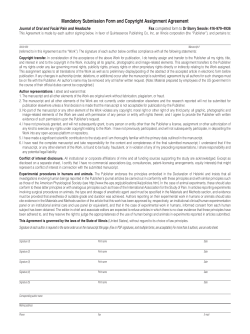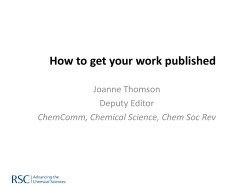
Manuscript submission and review
Manuscript submission and review Submission overview • • • • • • journal rules pre-review cover letter types of response post-review changes accepted, what to do? Journal Rules • Length • Formatting – Subsections – References (number/format) – Order of sections Pre-review • A critical part of the manuscript writing process. • Not only improves quality, but sends message to editor/reviewers. Cover letter • For editor only, usually not reviewers • Critical for high impact journals. • Compare: Dear Editor, Please find attached a manuscript entitled „...“ to be considered for publication in your journal. Yours sincerely... Cover letter Dear Editor, Please find attached our manuscript entitled “Habitat modification alters food web structure”, to be considered for publication as a Letter to Nature. Our manuscript provides the first replicated, quantitative demonstration of the consequences of human habitat modification for networks of feeding interactions among species. These changes are likely to have large functional consequences, but would be difficult to detect using conventional approaches to quantifying biodiversity. There has been a recent surge of interest in the potential effects of global change on species interactions, and the ability of ecosystems to resist these perturbations. Quantitative food webs provide a powerful tool to allow us to answer such questions, but to date they have been used to describe individual communities. Consequently, the structural changes to ecological networks that may occur following human impacts have remained unknown. Cover letter We solicited pre-reviews from a number of world leaders in this subject (see Acknowledgements). All were enthusiastic, not only for the exciting results, but also for the methodology, which they felt marked a long-awaited turning point from the use of food webs as descriptive tools, to their use as replicated units for hypothesis testing. We are confident that this manuscript, when accepted, will be widely and frequently cited for many years. Yours sincerely… Types of response Accept without revision Good Minor revisions Major revisions Reject following revision Reject without revision Bad Types of response Accept without revision Good Minor revisions Major revisions Reject following revision Reject without revision Bad “Thank you very much for submitting your manuscript “…" for review by Ecology. The reviewers and I appreciate the work you have accomplished. Based on the reviews, we are willing to consider a revised version for publication in the journal, assuming that you are able to modify the manuscript according to the recommendations.” Types of response Accept without revision Good Minor revisions Major revisions Reject following revision Reject without revision Bad “I have received two reviews of your manuscript “... The reviewers and I appreciated seeing data from an open-field system… The reviewers' comments were generally positive, but each made several suggestions that could further strengthen this paper. I highlight a few key constructive criticisms below. I will need to see that you have carefully addressed each of these concerns, and indeed all points raised by the two reviewers, before reaching a final decision on the manuscript's acceptability for publication in Ecology.“ Types of response Accept without revision Good Minor revisions Major revisions Reject following revision Reject without revision Bad “Please find enclosed the comments from the referees who have evaluted your ms O15380 for Oikos. I am sorry to report that the EiC of Oikos has decided not to accept your ms for publication. I hope the closed comments may be of value for you.” Types of response Accept without revision Good Minor revisions Major revisions Reject following revision Reject without revision Bad “This is the kind of descriptive ecology that explains little and predicts less. Try a more specialised journal.” Reviewer responses • Criticism is meant to be constructive and overall peer review should improve your work • Some reviews can even be very hurtful • DON’T TAKE IT PERSONALLY • Respond to all the criticisms that you consider valid, but be prepared to rebut any that you think are pointless, or just plain wrong. Post-review changes • Again a cover letter is needed. • Compare: Dear Editor, Please find attached a revised version of our manuscript. We have addressed all of the reviewers‘ concerns. Yours sincerely... Post-review changes • Dear Editor, Thank you very much for your consideration of our manuscript and request for a revised version. We have copy and pasted all reviewers’ comments below, and address each one individually. As you will see, we have made every attempt to incorporate these suggestions as thoroughly as possible. Unfortunately, the reviewers requested additional analyses and material, which added length to the manuscript… Post-review changes • 2) Several ideas are presented in the first paragraph of the introduction and it would be clearer if this large paragraph was divided according to the main idea discussed. Also, the topic of the second paragraph is broached in one part of the first paragraph and these discussions should be merged. • - We have now restructured the introduction as suggested by the reviewer. • 3) That habitats could vary in temporal turnover (a major point later on in the paper) is not brought up in the introduction, or at least not brought up clearly, it should be. Also, it might be helpful for the authors to mention or discuss some of the reasons why temporal turnover in diversity might occur (e.g., strong seasonality, etc.) • - We have now emphasized this point more in the introduction (P.3 L.8, P.3 L.16 - P.4 L.1, also Hypothesis 1). Post-review changes • Avoid the temptation to be argumentative (even when the reviewer is wrong). • Make all requested changes unless you have a significant reason not to. • If you don’t agree, try to cite references to support your argument. Accepted, what to do? • You will need to upload a final version with publication quality figures. • After some time, proofs will be sent. • Start thinking about the next manuscript...
© Copyright 2025





















